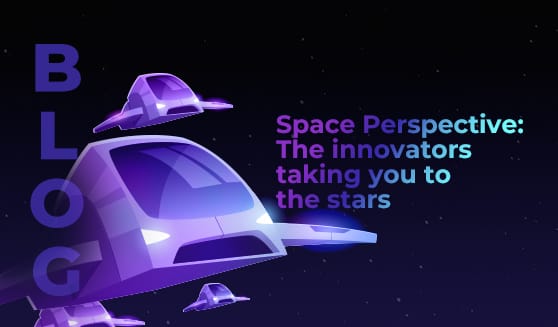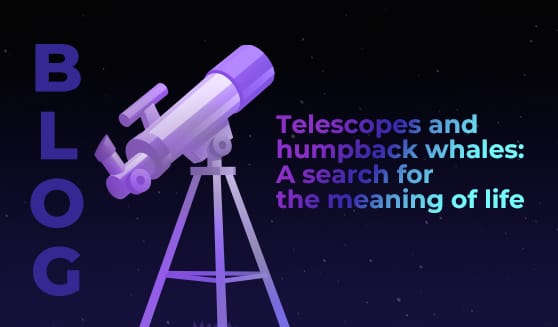
“During my time there, I had a visceral connection with the world I was living in – I could feel the edges, breathe the oxygen supplied by the plants. At one point, I and the rest of the crew turned orange from eating so many sweet potatoes.”
LEAP 2024 speaker Jane Poynter (Co-Founder and Co-CEO at Space Perspective) spent two years living in Biosphere 2 – a 1.27 hectare Earth system science research facility in Oracle, Arizona. She led the design of the agriculture systems there, as a member of the first crew to execute a mission in the facility.
Poynter emerged from the experiment knowing that she wanted to work in space – and went on to co-found an innovative space travel company that aims to make it possible (and enjoyable) for tourists to experience life from a very different perspective.
She told us what she took with her from Biosphere 2 to drive future decisions, and why it’s so important to her to give more people a meaningful, gentle experience of space travel. Here’s what she told us.
Could you share your career journey so far – or specifically, any pivotal moments that ignited your passion for space?
“I founded Space Perspective, the world’s first carbon-neutral human spaceflight experience company, with my business partner of more than 30 years – Taber MacCallum, who also happens to be my husband.
“We were both members of the Biosphere 2 design team and the original crew who lived for two years inside the sealed, self-sustaining habitat. I led the agriculture system, providing food, oxygen and drinking water for the eight-member crew, and Taber was responsible for creating the analytical laboratory that monitored the air, water, and soil.
“Many of the insights learned in Biosphere 2 were the basis for future innovations, including in space. During my time there, I had a visceral connection with the world I was living in – I could feel the edges, breathe the oxygen supplied by the plants. At one point, I and the rest of the crew turned orange from eating so many sweet potatoes.
“I later learned that that experience was much like that of astronauts who have gone to space. Many of them return with an entirely different perspective on our planet and our place within it. That's when the connection was made.”
On a personal level, what did you learn about yourself and your goals during your time inside Biosphere 2?
“After the Biosphere, both Taber and I were driven to pursue working in space. We founded a company called World View, which now specialises in stratospheric ballooning and remote sensing and communications.
“We then went on to found Paragon Space Development Corporation, which has environmental control technologies on every U.S. human spacecraft including the International Space Station.
“Google executive Alan Eustace chose Paragon to realise his dream of breaking the world freefall record, previously held by Felix Baumgartner and the Red Bull Stratos team, in what was called the StratEx project. In 2014, the StratEx team flew Eustace to 136,000 feet to become the highest flying human under a balloon.
“He is a founding board member of Space Perspective, which we founded to take as many humans to space as possible through a completely reimagined, safe, accessible spaceflight experience.”
Why is it important that space explorers have meaningful experiences in space – and how do you facilitate that?
“Good question. Space Perspective is the world’s first and only carbon-neutral spaceflight experience company. We are driven by a desire to share the transformative power of space travel with as many people as possible. We know that looking down on planet Earth from the deep blackness of space – the quintessential astronaut experience – will radically shift one’s perception of our world and our place within it.
“Astronauts often return from missions with a fire inside them; many get involved in environmental and societal causes. Often referred to as the overview effect, we call this the Space Perspective. And we think it can change the world and create a better future for our planet.
“In terms of how we do that, it's really an incredible experience we are offering. Spaceship Neptune features a pressurised capsule that accommodates eight Explorers and a Captain, a Reserve Descent System, and a SpaceBalloon™, which propels the capsule to 100,000 ft at cycling speed (about 12 mph). Space balloons have been safely flown to over 100,000 ft (30 km) more than a thousand times by NASA, other entities, and our own team members – including with payloads heavier than our Spaceship Neptune capsule.
“Unlike other spaceflight experiences, we don't use rockets. Explorers will embark on a six-hour journey in the world’s first Space Lounge – complete with Wi-Fi, a lavatory that we are calling the Space Spa, and the largest windows ever flown to space. Those on board can look forward to a world-class meal and cocktail service and a fully customisable end-to-end experience.”
As an entrepreneur focused on the space industry, what are the key challenges that startups in this segment face?
“It's an exciting and pivotal moment for the space industry as more players and private companies take leadership positions in the future of space travel. We are proud to be part of the growing space economy, and particularly proud to be offering a way to space that is as gentle on our customers as it is on our planet.
“Any startup in this realm will be subject to the ebbs and flows of the economy and in available capital and the time it requires to become operational. We have managed to make tremendous progress in even the last few months, completing refurbishment of our launch vessel, Marine Spaceport Voyager, and finishing our test capsule, Spaceship Neptune - Excelsior – key milestones that help us navigate challenges and, even more so, seize opportunities.
“The new space age isn't on the horizon – it's here. And while we are focused on tourism, we will be doing much more – from facilitating climate science research and driving impact with NGO partners to pushing culture forward with incredible projects in the arts.
“Space is a source of boundless beauty and inspiration and we've been encouraged by how many partners are coming to the table to do what's never been done before, together.”
Finally, why are events like LEAP valuable to you?
“Meeting and listening to other founders is a privilege and an honour. I always walk away from events like this completely blown away and with a real sense of community.
“And being at the centre of the growing space industry, I'm always delighted to meet those interested in becoming part of the new space economy with us, including having conversations around expanding the business internationally.
“The way we've built our operations is intentionally highly scalable – launching from ships allows us to operate more flights because you can sail into and actually create ideal launch conditions. There are many places in the world where the view from 100,000 feet will be spectacular.”
Thanks to Jane Poynter at Space Perspective. Did you miss LEAP 2024? Don’t worry! Meet us in Riyadh for the 2025 edition – pre-register now.








